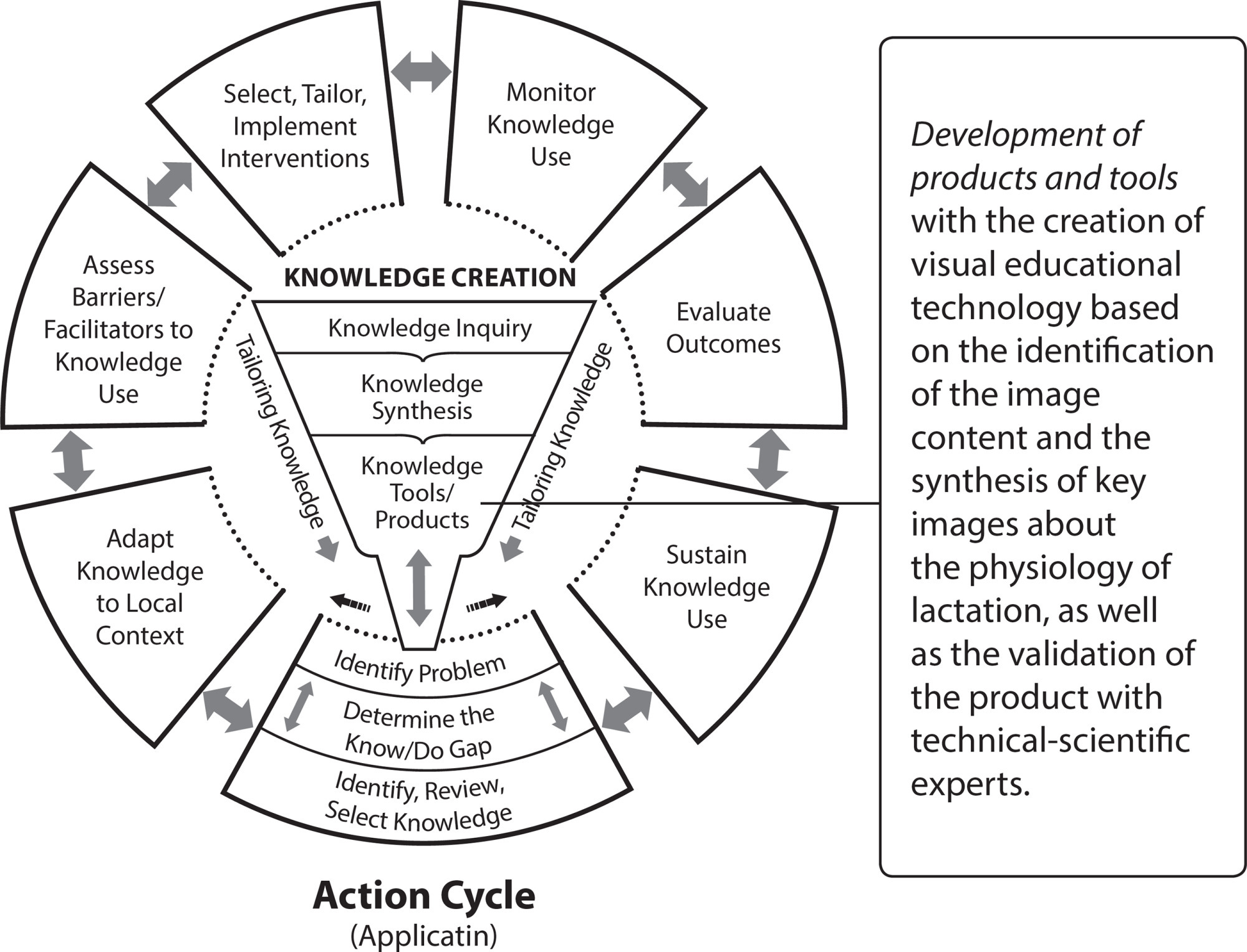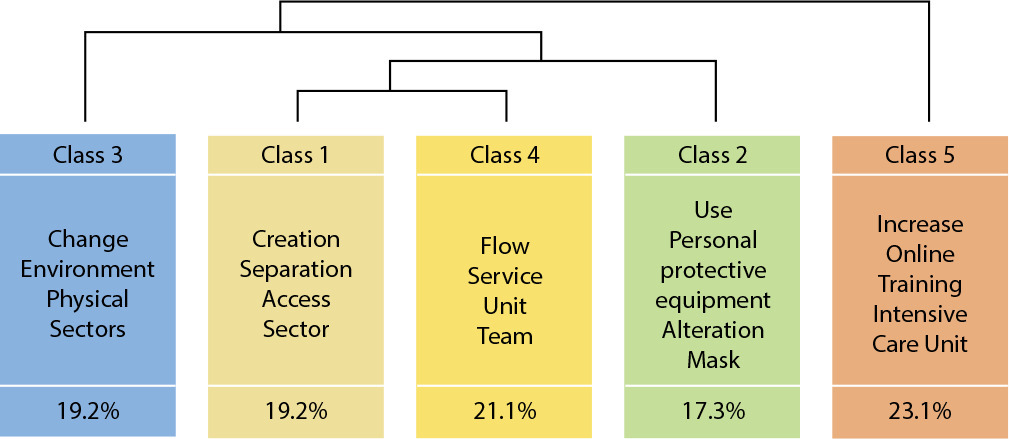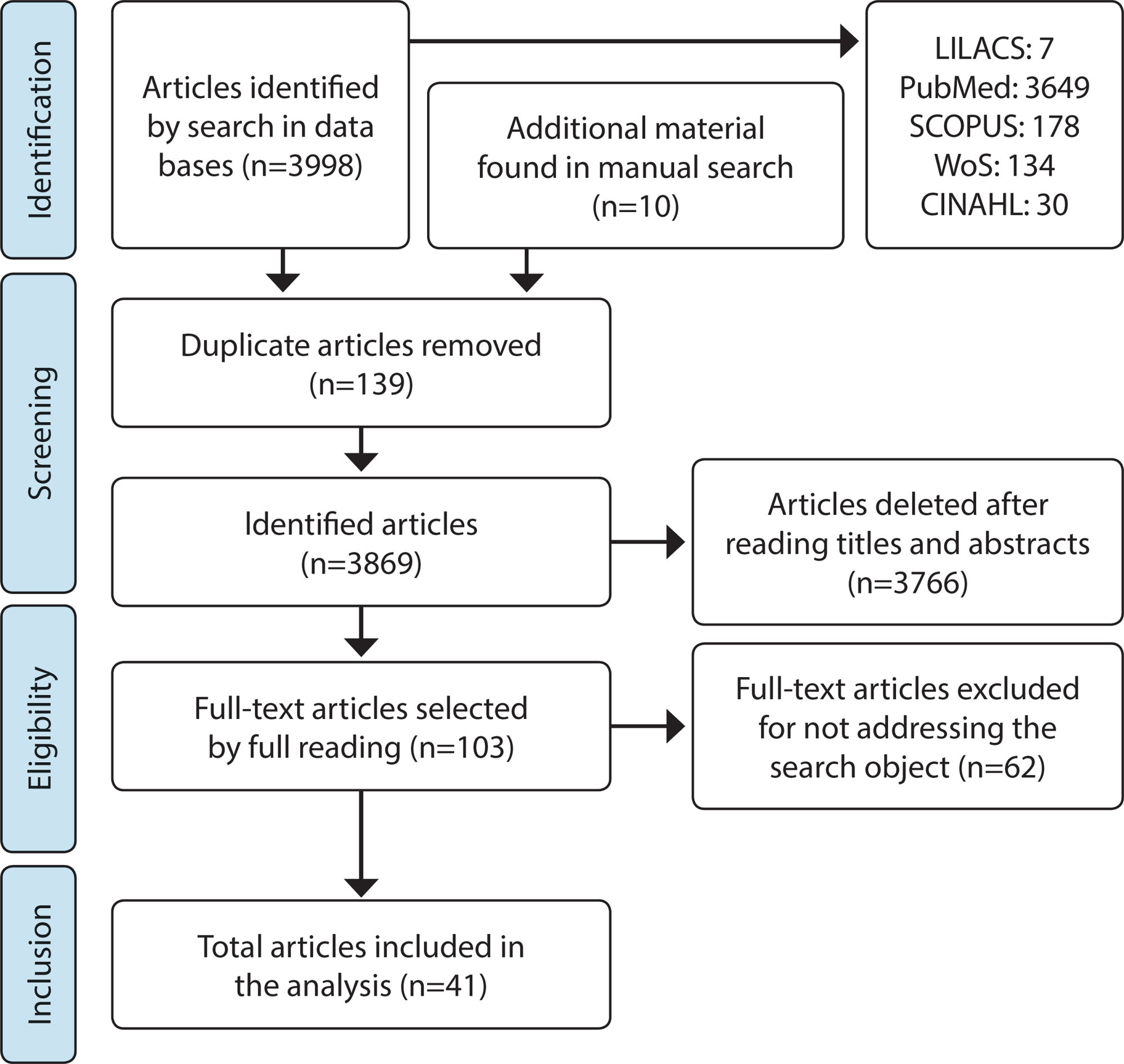-
ORIGINAL ARTICLE12-16-2024
Construction and validation of an educational game on biosafety in the central sterile supply department
Revista Brasileira de Enfermagem. 2024;77(6):e20230478
Abstract
ORIGINAL ARTICLEConstruction and validation of an educational game on biosafety in the central sterile supply department
Revista Brasileira de Enfermagem. 2024;77(6):e20230478
DOI 10.1590/0034-7167-2023-0478
Views0See moreABSTRACT
Objectives:
to construct and validate an educational game on biosafety in the Central Sterile Supply Department of a hospital in Curitiba, PR.
Methods:
the study was conducted using a quantitative approach, employing applied and technological research with an exploratory design. The process was divided into six stages, from the definition of the theme to the validation and application of the game. The study was carried out from May to August 2022, involving 17 nursing professionals from a Central Sterile Supply Department during day and night shifts, as well as 9 judges.
Results:
the study resulted in the construction of a board game named by the authors as “My Health First.”
Conclusions:
the research achieved its objective of constructing and validating an educational game. By reflecting on professional practice and correlating the occupational risks present, the professionals were able to list safe actions, identify problems, and seek solutions.

-
ORIGINAL ARTICLE12-16-2024
Health literacy development of Primary Health Care patients: qualitative research
Revista Brasileira de Enfermagem. 2024;77(6):e20240154
Abstract
ORIGINAL ARTICLEHealth literacy development of Primary Health Care patients: qualitative research
Revista Brasileira de Enfermagem. 2024;77(6):e20240154
DOI 10.1590/0034-7167-2024-0154
Views0See moreABSTRACT
Objectives:
to identify the process of health literacy development among primary care patients, relating it to their self-care practices.
Methods:
qualitative, prospective research with 22 patients from two Family Health Strategy units. Data were obtained through individual semi-structured interviews, examined through descriptive statistics and thematic content analysis.
Results:
the results discuss how participants learn about health and how this resonates in their behaviors, culminating in two thematic categories: “Health knowledge construction”; and “Dialogue between health knowledge construction and patient care actions”.
Final Considerations:
health knowledge is developed mainly through interpersonal relationships, mediated by health professionals through bonding and communication. Community educational actions and training of health professionals in communication can promote health literacy and self-care among patients.

-
ORIGINAL ARTICLE12-16-2024
Analysis of omission of antimicrobial doses in Intensive Care Units
Revista Brasileira de Enfermagem. 2024;77(6):e20240102
Abstract
ORIGINAL ARTICLEAnalysis of omission of antimicrobial doses in Intensive Care Units
Revista Brasileira de Enfermagem. 2024;77(6):e20240102
DOI 10.1590/0034-7167-2024-0102
Views0See moreABSTRACT
Objectives:
to analyze the rate of antimicrobial dose omission in intensive care units.
Methods:
cross-sectional study carried out between March 1 and September 30, 2023, in intensive care units of a University Hospital in Rio de Janeiro.
Results:
the sample consisted of 452 prescriptions and 1467 antimicrobial doses. The dose omission rate was 4.29%. Each antimicrobial prescribed increased the chance of omission by 51%. The strategy of double-checking prescriptions helped prevent 30% of antimicrobial dose omissions (p=0.0001).
Conclusions:
monitoring the omission of antimicrobial doses can guide nursing actions to improve quality and patient safety, contributing to the prevention of medication errors, antimicrobial stewardship and the fight against antimicrobial resistance.
-
REVIEW12-16-2024
Recommendations for guidelines for promoting mental health in the workplace: an umbrella review
Revista Brasileira de Enfermagem. 2024;77(6):e20240086
Abstract
REVIEWRecommendations for guidelines for promoting mental health in the workplace: an umbrella review
Revista Brasileira de Enfermagem. 2024;77(6):e20240086
DOI 10.1590/0034-7167-2024-0086
Views1See moreABSTRACT
Objectives:
to summarize the recommendations of guidelines for promoting mental health in the workplace.
Methods:
an umbrella review, according to Joanna Briggs Institute and Preferred Reporting Items for Systematic reviews and Meta-Analyses methodological assumptions. Data collection was carried out in January 2021 and updated in July 2023 in the American Psychological Association, Cochrane Library, EMBASE, National Library of Medicine, and Scopus databases. Systematic reviews that assessed guidelines with recommendations for mental health care for workers were included. PROSPERO registration CRD42023461845.
Results:
four systematic reviews published between 2015 and 2018 were identified. The abstracts highlighted actions that facilitate and inhibit the recommendations as well as three categories of intervention: primary prevention – worker protection; secondary prevention – promoting workers’ mental health; and tertiary prevention – supporting, monitoring and rehabilitating workers upon returning to work.
Conclusions:
the interventions are based on prevention, promotion and early recognition, support and rehabilitation of mental health problems.

-
ORIGINAL ARTICLE12-16-2024
Psychometric analysis of ProQOL-BR in nursing: building hospital safety and protection
Revista Brasileira de Enfermagem. 2024;77(6):e20240085
Abstract
ORIGINAL ARTICLEPsychometric analysis of ProQOL-BR in nursing: building hospital safety and protection
Revista Brasileira de Enfermagem. 2024;77(6):e20240085
DOI 10.1590/0034-7167-2024-0085
Views0See moreABSTRACT
Objectives:
to analyze the psychometric properties of the ProQOL-BR instrument in hospital nursing professionals.
Methods:
a methodological study to validate the ProQOL-BR. Confirmatory factor analysis, assessment of local and global adjustment quality, Pearson hypothesis testing and Cronbach’s alpha internal consistency analysis were used.
Results:
a total of 490 professionals participated. The model presents adequate quality due to factor weights (λ≥ 0.40), acceptable overall fit quality and adequate chi-square ratio and degrees of freedom (χ2/g.1=2.51) for the parameters of CFI (0.923), GFI (0.902), TLI (0.914) and RMSEA (0.042). In terms of validity, it was shown to be adequate with CC=0.89. The internal consistency obtained by standardized Cronbach’s alpha was 0.761. Criterion validity was shown to be favorable with significant correlations (0.001).
Conclusions:
the instrument was validated regarding content, criteria and reliability. Three questions were removed from the original instrument, ProQOL-BR, leaving the final instrument with 25 questions.

-
12-16-2024
GerenciaDOR™: development of digital technology by nurses for the assessment of patients with chronic pain
Revista Brasileira de Enfermagem. 2024;77(6):e20240050
Abstract
GerenciaDOR™: development of digital technology by nurses for the assessment of patients with chronic pain
Revista Brasileira de Enfermagem. 2024;77(6):e20240050
DOI 10.1590/0034-7167-2024-0050
Views0See moreABSTRACT
Objectives:
to develop a digital technological solution (prototype) for assessing patients with chronic pain.
Methods:
this is a methodological and technological development study based on the Human-Centered Design framework and the principles of Patient-Centered Care. The prototype guides patients through a body diagram and directs them to an evaluation using specific instruments that address the multidimensional aspects of chronic pain.
Results:
the GerenciaDOR* project enables navigation through the Web App screens, providing access to pain assessment features up to the presentation of results.
Final Considerations:
the study describes a systematic approach to pain assessment and expands nurses’ knowledge in pain management. Additionally, it can promote the development of other digital technologies for chronic pain assessment and contribute to a multidisciplinary, patient centered treatment.

-
ORIGINAL ARTICLE12-16-2024
Respectful care for postpartum women with sickle cell disease: a netnographic study
Revista Brasileira de Enfermagem. 2024;77(6):e20230545
Abstract
ORIGINAL ARTICLERespectful care for postpartum women with sickle cell disease: a netnographic study
Revista Brasileira de Enfermagem. 2024;77(6):e20230545
DOI 10.1590/0034-7167-2023-0545
Views1See moreABSTRACT
Objectives:
to analyze principles of respectful maternity care in narratives of postpartum women with sickle cell disease, relating them to Sustainable Development Goals.
Methods:
netnographic study, with two videos published in 2020. Deductive iconographic and thematic analysis by Respectful Maternity Care Charter, organized in MAXQDA.
Results:
principles identified were the right to: freedom from harm and ill-treatment; information, informed consent, refusal of medical procedures, and respect for their choices and preferences including companion; be considered a person from birth, with dignified and respectful treatment; health at the highest possible level; newborns being with their parents or guardians. The Sustainable Development Goals for women by 2030 were not positively contemplated in postpartum women’s experience.
Final Considerations:
it is appropriate that health workers qualify themselves to provide respectful maternity care, with qualified listening, understanding, and resolution of unique demands of postpartum women with sickle cell disease, seeking equality in care for women.

-
REVIEW12-16-2024
Strategies for expanding vaccination coverage in children in Brazil: systematic literature review
Revista Brasileira de Enfermagem. 2024;77(6):e20230343
Abstract
REVIEWStrategies for expanding vaccination coverage in children in Brazil: systematic literature review
Revista Brasileira de Enfermagem. 2024;77(6):e20230343
DOI 10.1590/0034-7167-2023-0343
Views1See moreABSTRACT
Objectives:
to identify the strategies found in the literature for increasing vaccination coverage among children in Brazil. It is justified mainly by the current scenario of falling vaccination coverage.
Methods:
systematic literature review. The search was carried out in the Pubmed (MEDLINE), Embase and Scopus databases, following the PRISMA guidelines.
Results:
initially, 4,824 results were returned. In the end, 6 studies were included for narrative synthesis using the SWiM methodology. Of these, 50% dealt with studies related to the Bolsa Família Program (PBF). The others explored strategies for approaching parents directly, Rapid Vaccination Monitoring (MRV) and the Community Health Agents Program (PACS). The PBF did not guarantee compliance with the conditionality of keeping vaccinations up to date. The MRV and PACS are effective strategies, especially because they allow active search for absentees.
Conclusions:
we conclude that more publications are needed on strategies to increase vaccination coverage among children in Brazil.

-
ORIGINAL ARTICLE09-07-2020
Creation and validation of a visual educational technology content for lactation physiology learning
Revista Brasileira de Enfermagem. 2020;73(6):e20190564
Abstract
ORIGINAL ARTICLECreation and validation of a visual educational technology content for lactation physiology learning
Revista Brasileira de Enfermagem. 2020;73(6):e20190564
DOI 10.1590/0034-7167-2019-0564
Views0See moreABSTRACT
Objective:
to create and validate a visual educational technology content for lactation physiology learning.
Method:
a methodological study that contemplated the stages of content creation and validation guided by the conceptual model of Knowledge Translation into action. The creation took place in partnership with the educational technology center of the project’s home institution. The validation was attended by 27 judges with experience in the obstetric, neonatal, pediatric or maternal and child areas and in the theme of breastfeeding.
Results:
an educational technology covered animation and video techniques to locate, respectively, elements of lactation physiology and the population involved. An Overall Content Validity Index of 0.84 was obtained.
Conclusion:
the visual educational technology for lactation physiology learning has been validated in content as a tool to introduce the theme and mediate health education actions that can have a positive impact on breastfeeding.

-
ORIGINAL ARTICLE10-21-2019
Permanent education for good practices in the prevention of pressure injury: almost-experiment
Revista Brasileira de Enfermagem. 2019;72(6):1646-1652
Abstract
ORIGINAL ARTICLEPermanent education for good practices in the prevention of pressure injury: almost-experiment
Revista Brasileira de Enfermagem. 2019;72(6):1646-1652
DOI 10.1590/0034-7167-2018-0778
Views0See moreABSTRACT
Objective:
To verify the effectiveness of the educational intervention through the evaluation of nurses’ knowledge about prevention of pressure injury.
Method:
A quasi-experimental study with a single group, carried out with 95 nurses from a teaching hospital in the interior of Minas Gerais, in August and September 2017. As a teaching strategy, the active methodology and hybrid teaching were used, based on the reference of the Method of the Arch of Charles Maguerez. Data were collected from a validated instrument, called the Pieper Knowledge Test, and analyzed by descriptive statistics and Student’s t-test with significance level of p <0.001.
Results:
The mean number of correct answers obtained by the nurses was 78.8% in the pre-test and 88.8% in the post-test, and the difference was statistically significant (p <0.001).
Conclusion:
The educational intervention developed was effective, since it contributed to the improvement of nurses’ knowledge.

-
ORIGINAL ARTICLE06-01-2020
Primary care mental health: nurses’ activities in the psychosocial care network
Revista Brasileira de Enfermagem. 2020;73:e20190104
Abstract
ORIGINAL ARTICLEPrimary care mental health: nurses’ activities in the psychosocial care network
Revista Brasileira de Enfermagem. 2020;73:e20190104
DOI 10.1590/0034-7167-2019-0104
Views0See moreABSTRACT
Objective:
to describe and analyze the role of expert nurses in mental health in the Family Health Strategy.
Method:
a qualitative study, with 20 Basic Health Units nurses of Teresina, Piauí. The information was collected through semi-structured interviews from March to May 2017 and analyzed using the content analysis method.
Results:
it was found that the conceptions of the mental health disease process were based on the biological model, there was little communication between mental health and basic network, nurses did not feel qualified to work mental health and there were few mental health actions in Primary Care.
Final considerations:
it becomes urgent to implement public policies that articulate mental health and Primary Care, raising awareness and continuing education for nurses.
-
ORIGINAL ARTICLE02-25-2022
Factors associated with stress, anxiety and depression in nursing professionals in the hospital context
Revista Brasileira de Enfermagem. 2022;75:e20210263
Abstract
ORIGINAL ARTICLEFactors associated with stress, anxiety and depression in nursing professionals in the hospital context
Revista Brasileira de Enfermagem. 2022;75:e20210263
DOI 10.1590/0034-7167-2021-0263
Views0See moreABSTRACT
Objective:
to determine the factors associated with stress, anxiety and depression, concomitantly, in nursing professionals who work in the hospital context.
Methods:
a quantitative and cross-sectional study with 353 nursing professionals from a hospital. A sociodemographic questionnaire and the Depression, Anxiety and Stress Scale-21 were used. Data were subjected to descriptive statistical analysis, difference and correlation tests.
Results:
the main factors associated with stress, anxiety and depression, concomitantly, were being female, compromised family and social support, lack of autonomy at work, hostile relationship with colleagues, lack of professional recognition and satisfaction, feeling of being overwhelmed and insecurity.
Conclusions:
demographic, physiological, social and work factors impact the levels of stress, anxiety and depression in nursing professionals. The adoption of coping strategies for modifiable factors should be considered, in order to provide better quality of life for these professionals.
-
ORIGINAL ARTICLE11-29-2022
Changes implemented in the work environment of nurses in the COVID-19 pandemic
Revista Brasileira de Enfermagem. 2022;75:e20201381
Abstract
ORIGINAL ARTICLEChanges implemented in the work environment of nurses in the COVID-19 pandemic
Revista Brasileira de Enfermagem. 2022;75:e20201381
DOI 10.1590/0034-7167-2020-1381
Views0See moreABSTRACT
Objective:
to describe the changes implemented in the work environment of nurses in university hospitals considering the COVID-19 pandemic.
Methods:
this qualitative and descriptive research was developed from an online survey with 75 nurses from three Brazilian university hospitals. Data processing occurred through textual analysis with the aid of software IRAMUTEQ.
Results:
five semantic classes were obtained: Organization of units for exclusive care of patients with COVID-19; Adaptations in the use of personal protective equipment; Physical structure adaptation; Care flow institution; Increased number of beds and training courses. Final considerations: the results show the effort of healthcare and nursing professionals/managers in the development of structural adaptations and reorganizations of care processes, in the hospital context, to respond with quality and efficiency to the demands arising from the COVID-19 pandemic.

-
03-03-2021
Concept analysis of Perioperative Thirst for the development of a new nursing diagnosis
Revista Brasileira de Enfermagem. 2021;74(1):e20200065
Abstract
Concept analysis of Perioperative Thirst for the development of a new nursing diagnosis
Revista Brasileira de Enfermagem. 2021;74(1):e20200065
DOI 10.1590/0034-7167-2020-0065
Views1See moreABSTRACT
Objectives:
to analyze the perioperative thirst concept for the development of a new diagnostic structure according to NANDA International.
Methods:
a concept analysis study based on the framework proposed by Walker and Avant, instrumentalized through an integrative literature review based on SCOPUS, CINAHL, PUBMED, LILACS, and WOS. The elaboration of the diagnostic structure followed NANDA International guidelines.
Results:
41 studies were analyzed revealing that perioperative thirst is prevalent and intense, having visceral and behavioral attributes as the core of the concept. Antecedents indicate that surgical patients are vulnerable to thirst; and consequents 16 signs and symptoms were organized and model cases were developed. A diagnostic structure has been developed for perioperative thirst.
Final Considerations:
concept analysis allowed language standardization that describes thirsty patients, helping the identification, planning of actions and communication of perioperative nursing care.

-
ORIGINAL ARTICLE09-06-2022
Evaluating the psychometric properties of the eHealth Literacy Scale in Brazilian adults
Revista Brasileira de Enfermagem. 2022;75(1):e20201320
Abstract
ORIGINAL ARTICLEEvaluating the psychometric properties of the eHealth Literacy Scale in Brazilian adults
Revista Brasileira de Enfermagem. 2022;75(1):e20201320
DOI 10.1590/0034-7167-2020-1320
Views0See moreABSTRACT
Objective:
To translate and adapt the eHealth Literacy Scale for the cultural reality of Brazil and to evaluate the psychometric properties of its Brazilian Portuguese version.
Methods:
The instrument was translated and adapted to Brazilian Portuguese and applied to a sample of 502 individuals from 18 to 80 years old who lived in the surrounding areas of six Family Health Units of a city in the countryside of the state of São Paulo, Brazil. The data was evaluated using exploratory and confirmatory factor analysis, item response theory, and instrument reliability measures (Cronbach’s alpha and McDonald’s omega).
Results:
The eHealth Literacy Scale – Brazilian version (eHEALS-Br) presented an excellent internal consistency (α = 0.95 e ω = 0.95), with only one dimension and an explained variation of 81.79%.
Conclusions:
The Brazilian version of the instrument showed excellent psychometric properties to measure the levels of digital health literacy in adults from the country.

-
REFLECTION05-11-2022
Nursing Process in the Brazilian context: reflection on its concept and legislation
Revista Brasileira de Enfermagem. 2022;75(6):e20210898
Abstract
REFLECTIONNursing Process in the Brazilian context: reflection on its concept and legislation
Revista Brasileira de Enfermagem. 2022;75(6):e20210898
DOI 10.1590/0034-7167-2021-0898
Views0See moreABSTRACT
Objectives:
to reflect on the global understanding of the Nursing Process concept, with emphasis on the Brazilian context.
Methods:
a reflection article, aligned with the vision and expertise of researchers who are members of the Nursing Process Research Network.
Results:
the reflection is presented in two main topics: The evolution of Systematization of Nursing Care X Nursing Process concepts and its consonance with national and international practices, and Brazilian legislation; The Nursing Process concept realignment in Brazilian legislation in line with current care, teaching and research practices. Final Considerations: the reflections were oriented to the Nursing Process’ conceptual, normative and legal issues, including elements of its historical evolution, and, with that, pointed to the need to modify the Brazilian regulation on the Nursing Process.
Search
Search in:
Nuvem de Tags
Adolescente (85) Atenção Primária à Saúde (239) COVID-19 (91) Criança (91) Cuidados de Enfermagem (269) Educação em Enfermagem (151) Educação em Saúde (139) Enfermagem (930) Enfermagem Pediátrica (86) Estudantes de Enfermagem (77) Estudos de Validação (131) Família (87) Idoso (208) Promoção da Saúde (99) Qualidade de Vida (104) Saúde do Trabalhador (86) Saúde Mental (145) Saúde Pública (82) Segurança do Paciente (150) Tecnologia Educacional (100)



